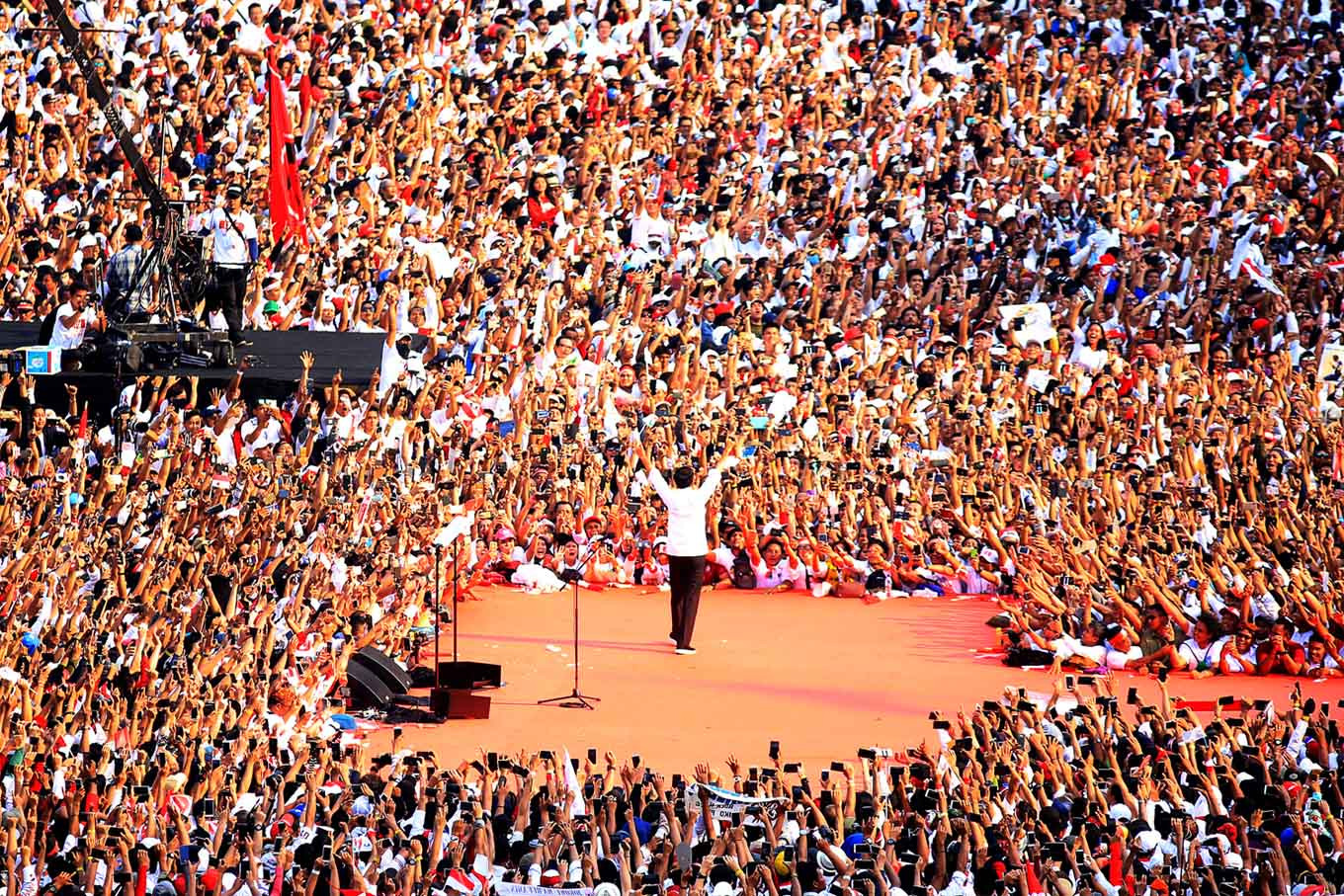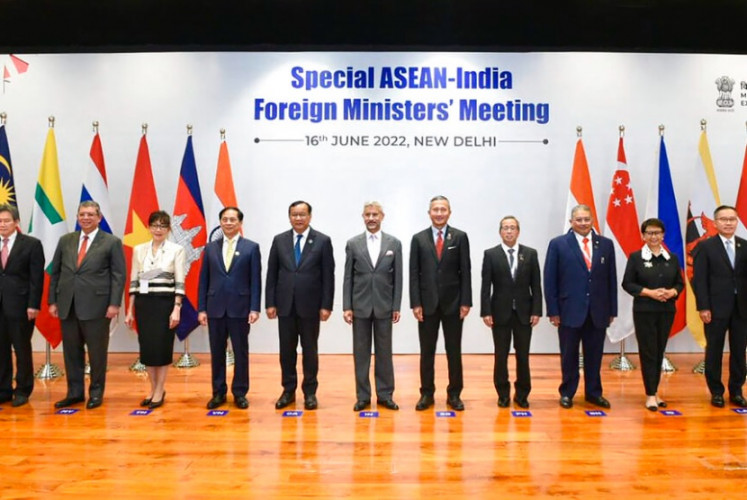Taking Indonesia beyond Sukarno and Soeharto
President Joko “Jokowi” Widodo has achieved that distinction in a way that has transformed Indonesian self-perceptions. Indonesians owe it to themselves to give him another five years in which to consolidate his success for future generations.
Change Size
 President Joko "Jokowi" Widodo greets his supporters during the last campaign event at the Gelora Bung Karno Stadium in Jakarta on Saturday. (JP/Seto Wardhana.)
President Joko "Jokowi" Widodo greets his supporters during the last campaign event at the Gelora Bung Karno Stadium in Jakarta on Saturday. (JP/Seto Wardhana.)
I
ndonesia goes to the presidential polls this week, its citizens may wish to remember that it is easy for a leader to be a nationalist, difficult for him to be an internationalist, and extremely challenging to be both.
President Joko “Jokowi” Widodo has achieved that distinction in a way that has transformed Indonesian self-perceptions. Indonesians owe it to themselves to give him another five years in which to consolidate his success for future generations.
In a sense, Jokowi draws on the strengths of former presidents Sukarno and Soeharto, the two founding figures of contemporary Indonesia. As a hero of the Independence struggle against the Dutch, Sukarno was the national leader par excellence. It was impossible to believe in the longevity of Indonesian freedom without thinking of him. Yet, he displayed an expansive view as well of Indonesia’s place in the world as a member of the anti-imperial club that was formed at the Bandung Conference in 1955, the crucible of the Non-Aligned Movement.
The declaration of Afro-Asian solidarity at Bandung manifested a determined effort by two formerly colonized continents to claim international space that was not foreclosed by the Cold War, born of the ideological tussle for global power between the United States and the Soviet Union.
Some of that thinking motivates Jokowi. He is proud to be Indonesian because he was born one and because the political system, for all its elitist bias, allowed a non-privileged person like him to ascend to the presidency. Much as the Independence struggle had made Sukarno the iconic Indonesian, triumphing over the everyday trials and tribulations of Indonesian independence made Jokowi worthy of the presidency.
It fell on Jokowi consequently to make Indonesia live up to the expectations of its citizens, and worthy of its place in the world. This, he has sought to do by engaging in global affairs in a throwback to his illustrious predecessor. In 2015, on the 60th anniversary of Bandung, he called for a more equitable global order that promoted shared leadership and not the domination of big countries. Given that a replay of the Cold War is possible in the current contest for supremacy between the US and China, Jokowi is a true Sukarnoist when he comments on world affairs.
Sukarno was flamboyant, charismatic, and an over-reacher. He fell when the forces that he had helped unleash or had tolerated – Indonesian communism in particular – turned on his nascent state. Soeharto inaugurated another Indonesia. It was politically taciturn and spartan with human rights and civil liberties. Yet, it was bold and adventurous. It freed up the economy (compared to Sukarno’s protectionist and nationalizing impulses), and it behaved as just another Southeast Asian country when in reality it was the region’s pre-eminent power.
The irredentism that unfortunately had crept into Sukarnoist foreign policy – apparent in konfrontasi against the formation of Malaysia – was something that Soeharto abjured resolutely. His quarrel was with communism, not with the West. Soeharto embarked on a collaborative enterprise that drew in Western (and Japanese) investments, made Indonesia an export-capable country, and gave Indonesians a new stake in the global and regional future. For all his differences with Sukarno, Soeharto was a nation-builder.
The nation has to be built differently at different times. So it is with President Jokowi. He has stayed true to Indonesia’s fundamental break with the autocratic Soeharto era. However, he recognizes that, at the end of the day, words such as “democracy” and “freedom” do no matter much without people’s access to the basic human empowerment afforded by food, clothing and shelter.
Farmer-friendly agriculture; better education for girls and boys; longer roads within the country; larger ports for a sprawling archipelago; and power plants are parts of the essential infrastructure of progress. They underpin the emergence of an Indonesia that can draw on the best offerings of the Sukarnoist and Soehartoist eras but move ahead without the economic atavism of the first historical era and the political regression of the second one. It would be exhilarating, indeed, if Indonesia could combine the political effervescence of the first period and the economic vivacity of its successor.
If anyone could do it, it would be Jokowi. Unlike predecessors who did not come close to those two definitive figures – perhaps they did not wish to – President Jokowi has succeeded in uniting the energies and resources of Indonesia’s past in his project for the future. He should have a hand in molding that future.
One determining element in the election results would be the issue of religion. Some Indonesians are caught up in the identity politics surrounding faith to the extent that their voting might be swayed by it ultimately. Here, it ought to be emphasized that President Jokowi is a pious Muslim who has not sought to capitalize on his piety. Hardly anyone could argue honestly and convincingly that Indonesia has become a less moral place in the past five years.
If anything, Jokowi’s personal integrity lends credence to his character, his character infuses national policies, and those policies make Indonesia a better country for Muslims and non-Muslims alike. What he has done assiduously is to keep religion and politics separate. That does not make Indonesia a secular country such as e.g. France, but a Pancasila nation that is living up to its own ideals.
Surely, patriotic Indonesian Muslims do not begrudge the minorities their share of the national comfort zone of peace and tolerance. What is important to them is that Islam should not be under threat. It is not besieged under Jokowi, and it will not be should he win this month.
Ultimately, of course, the choice is one which Indonesians, and only they, can make. However, they need to ponder how much of their history is at stake in this election. Indonesia would gain if President Jokowi were to be given the opportunity to carry on the legacy of Sukarno and Soeharto to build a new Indonesia that goes beyond their achievements.
***
The writer is founder and chairman of Mobile FutureWorks Inc, a global leader in the digital economy with over 100 companies in internet, mobile, payments and real estate. He was formerly Asia-Pacific director of Nokia Corporation and global head of Nokia’s brand, image and marketing. He was also a leading youth politician in his native Finland.








